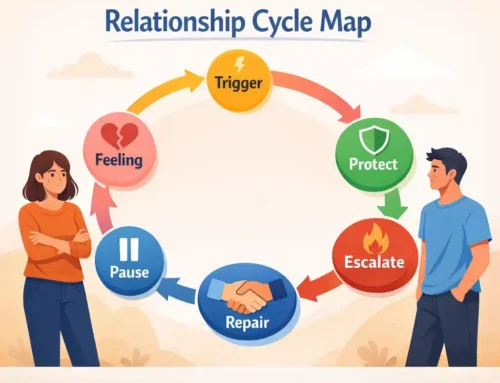
Approx. read time: 9.4 min.
Post: Personality Types of Women in Relationships
Understanding the personality types of women in relationships is crucial in comprehending how they navigate love, emotional health, and identity. Each woman is unique, but certain patterns emerge that can help in understanding how they approach relationships, deal with emotional upsets, and strive to maintain their emotional well-being.
1. The Nurturer
The Nurturer is a woman who finds deep satisfaction in caring for others. In relationships, she is the one who goes out of her way to ensure her partner is comfortable, happy, and loved. Her natural inclination is to support, provide, and maintain harmony within the relationship.
- Strengths: The Nurturer is empathetic, compassionate, and deeply attuned to her partner’s needs. Her ability to create a warm and loving environment often makes her the cornerstone of emotional stability in a relationship.
- Challenges: The Nurturer’s tendency to put others’ needs before her own can lead to emotional exhaustion. She might neglect her own needs, leading to feelings of resentment, burnout, or a loss of self-identity.
2. The Independent
The Independent woman values her autonomy and self-sufficiency. She seeks relationships that respect her need for space and individuality. While she is deeply committed, she also requires a partner who understands her need for independence.
- Strengths: The Independent is self-reliant, confident, and often has a strong sense of self. She brings a balanced perspective to relationships, ensuring that she and her partner maintain their individuality.
- Challenges: Her need for independence can sometimes be misinterpreted as detachment or disinterest. If not communicated effectively, this can lead to misunderstandings or conflicts within the relationship.
3. The Romantic Idealist
The Romantic Idealist approaches relationships with a deep sense of passion and idealism. She believes in true love and often envisions a fairy-tale romance. Her heart guides her decisions, and she seeks a partner who can fulfill her emotional and romantic desires.
- Strengths: The Romantic Idealist brings warmth, passion, and a deep emotional connection to her relationships. She often inspires her partner to engage in thoughtful gestures and emotional intimacy.
- Challenges: Her idealistic views can lead to disappointment when reality doesn’t match her expectations. This can cause emotional distress and feelings of disillusionment, affecting her emotional health over time.
4. The Caregiver
The Caregiver, similar to the Nurturer, finds joy in taking care of her partner. However, the Caregiver often takes on a more parental role, seeking to guide, support, and protect her partner.
- Strengths: The Caregiver is nurturing, protective, and often deeply committed to the well-being of her partner. She creates a safe and loving environment, which can be the foundation of a strong relationship.
- Challenges: The Caregiver’s tendency to take on too much responsibility can lead to an imbalance in the relationship. If her partner becomes too dependent on her, she might feel overwhelmed or trapped, leading to emotional strain.
5. The Free Spirit
The Free Spirit is spontaneous, adventurous, and loves to live in the moment. She brings excitement and novelty to relationships, often encouraging her partner to step out of their comfort zone and experience life to the fullest.
- Strengths: The Free Spirit brings energy, creativity, and a sense of adventure to relationships. Her enthusiasm is contagious, often bringing joy and spontaneity to the partnership.
- Challenges: Her spontaneous nature can sometimes be perceived as unpredictable or unreliable. If her partner requires stability and routine, conflicts may arise, leading to emotional friction.
6. The Rational Thinker
The Rational Thinker approaches relationships with logic and reason. She values communication, honesty, and a clear understanding of roles and expectations within the relationship. Emotions are important to her, but they are often tempered with a rational approach.
- Strengths: The Rational Thinker is level-headed, pragmatic, and often a strong communicator. She brings a balanced perspective to relationships, ensuring that emotions are managed with reason and understanding.
- Challenges: Her logical approach can sometimes come across as cold or detached. If not balanced with emotional expression, this can lead to misunderstandings or emotional disconnect in the relationship.
Women’s Emotional Relationship Upsets: The Slow Death of Emotional Health and Identity
Relationships are a significant part of a woman’s life, and the emotional ups and downs that accompany them can have profound effects on her emotional health and identity. While relationships can be a source of joy, love, and fulfillment, they can also lead to emotional distress when things go awry.
Common Emotional Relationship Upsets
- Lack of Communication
- Communication is the backbone of any relationship. When communication breaks down, it can lead to misunderstandings, unmet needs, and emotional distance. A woman may feel unheard, unappreciated, or misunderstood, which can erode her emotional well-being over time.
- Betrayal and Infidelity
- Betrayal, whether through infidelity or broken trust, is one of the most painful experiences in a relationship. It can shatter a woman’s sense of security and lead to feelings of worthlessness, anger, and deep emotional pain. The trauma of betrayal often has long-lasting effects on her emotional health and can cause a loss of identity as she questions her self-worth and role in the relationship.
- Emotional Neglect
- Emotional neglect occurs when a partner fails to provide the emotional support and connection that a woman needs. This can lead to feelings of loneliness, abandonment, and inadequacy. Over time, emotional neglect can cause a woman to feel invisible and unimportant, eroding her sense of self and emotional health.
- Controlling or Manipulative Behavior
- Relationships where one partner exhibits controlling or manipulative behavior can be incredibly damaging to a woman’s emotional health. This behavior can manifest as jealousy, possessiveness, or gaslighting, leading to confusion, self-doubt, and a gradual loss of self-identity.
- Unresolved Conflicts
- Conflicts are a natural part of any relationship, but when they remain unresolved, they can fester and cause significant emotional distress. Constant arguments, unresolved issues, and the inability to reach a compromise can create a toxic environment that slowly wears down a woman’s emotional resilience.
- Lack of Emotional Intimacy
- Emotional intimacy is crucial for a healthy relationship. When it’s lacking, a woman may feel disconnected from her partner, leading to feelings of isolation and loneliness. The absence of emotional intimacy can result in a slow, painful decline in the relationship, ultimately affecting her emotional health.
The Impact on Emotional Health and Identity
The emotional upsets in relationships can have a profound impact on a woman’s emotional health and sense of identity. Over time, repeated emotional stress can lead to:
- Anxiety and Depression: Constant emotional distress can lead to the development of anxiety and depression. A woman may feel overwhelmed by negative emotions, leading to a decline in her mental health.
- Loss of Self-Worth: When a woman experiences repeated emotional pain, she may begin to internalize these negative experiences, leading to a loss of self-worth. She might start to believe that she is unworthy of love, happiness, or respect.
- Identity Erosion: Relationships that are emotionally damaging can erode a woman’s sense of identity. She may lose touch with who she is, what she values, and what she desires in life. This loss of identity can be deeply unsettling and lead to a sense of emptiness or purposelessness.
- Emotional Withdrawal: As a defense mechanism, a woman might start to emotionally withdraw from the relationship and other areas of her life. This withdrawal can lead to a sense of numbness, where she feels disconnected from her emotions, her partner, and even herself.
How a Woman Can Become Emotionally Stronger
Building emotional strength is essential for women to navigate the complexities of relationships while maintaining their emotional health and identity. Here are some strategies that can help women become emotionally stronger:
1. Self-Awareness and Reflection
- Understanding Emotions: Self-awareness is the first step towards emotional strength. By regularly reflecting on her emotions, a woman can identify what triggers her emotional responses and how she can manage them effectively.
- Journaling: Keeping a journal can be a powerful tool for self-reflection. Writing down thoughts and emotions can help a woman process her feelings, identify patterns, and gain insights into her emotional experiences.
2. Setting Healthy Boundaries
- Knowing Limits: Setting boundaries is crucial in maintaining emotional health. A woman should clearly define what is acceptable and unacceptable in a relationship, ensuring that her emotional needs are respected.
- Assertiveness: Being assertive in communicating her boundaries is essential. This involves expressing her needs and limits clearly and confidently without feeling guilty or apologetic.
3. Building a Support System
- Trusted Friends and Family: Having a support system of trusted friends and family members can provide emotional strength. These individuals can offer a listening ear, advice, and encouragement during difficult times.
- Professional Help: Seeking professional help from a therapist or counselor can be incredibly beneficial. Therapy provides a safe space for a woman to explore her emotions, work through relationship challenges, and build emotional resilience.
4. Practicing Self-Care
- Physical Health: Emotional strength is closely tied to physical well-being. Regular exercise, a balanced diet, and adequate sleep are essential for maintaining emotional health.
- Mental Health: Engaging in activities that promote mental health, such as meditation, mindfulness, or creative hobbies, can help a woman manage stress and build emotional resilience.
- Emotional Self-Care: Emotional self-care involves taking time to nurture her emotions. This can include activities like spending time in nature, practicing gratitude, or engaging in activities that bring joy and fulfillment.
5. Developing Emotional Intelligence
- Empathy: Developing empathy allows a woman to understand and relate to her partner’s emotions, fostering a deeper emotional connection and reducing conflicts.
- Emotional Regulation: Learning to regulate emotions is key to maintaining emotional health. This involves recognizing when emotions are becoming overwhelming and taking steps to manage them, such as through deep breathing, mindfulness, or taking a break.
- Effective Communication: Emotional intelligence also involves communicating emotions effectively. This means expressing feelings clearly and calmly, without resorting to blame or aggression.
6. Embracing Self-Love and Acceptance
- Self-Compassion: Practicing self-compassion involves treating oneself with kindness and understanding, especially during difficult times. This can help a woman build resilience and bounce back from emotional setbacks.
- Positive Affirmations: Using positive affirmations can reinforce a woman’s sense of self-worth and identity. Affirmations like “I am worthy of love and respect” or “I trust myself to handle life’s challenges” can empower her to stay emotionally strong.
- Celebrating Achievements: Recognizing and celebrating personal achievements, no matter how small, can boost self-esteem and reinforce a positive self-image.
Understanding the different personality types of women in relationships is essential for fostering healthy and fulfilling partnerships. Each personality type brings its own strengths and challenges to a relationship, and recognizing these can help both partners navigate their emotional journeys more effectively.
Emotional relationship upsets, such as lack of communication, betrayal, and emotional neglect, can have devastating effects on a woman’s emotional health and identity. However, by building emotional strength through self-awareness, setting boundaries, practicing self-care, and developing emotional intelligence, women can protect their emotional well-being and maintain a strong sense of identity.
Ultimately, becoming emotionally stronger enables women to navigate the complexities of relationships with confidence, resilience, and self-assurance, leading to healthier, more fulfilling connections with their partners and themselves.










